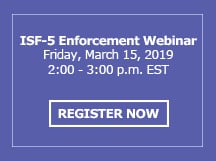News

ISF-5 Enforcement and CBP Webinar on March 15th
March 11, 2019 •Avalon

As a reminder, CBP issued CSMS #19-000063 on February 12, 2019, which announced that ISF-5 enforcement will begin on Friday, March 15, 2019. On this date, CBP will enter the final phase of ISF enforcement and begin issuing liquidated damages for late or inaccurate ISF-5 shipments.
 It is important to note that CBP expanded the definition of an ISF importer for ISF-5 shipments with its final ruling issued on April 12, 2018 (83 FRN 15736). The FRN expanded the definition of an ISF Importer on ISF-5 shipments to properly reflect the party that causes the goods to arrive within the limits of a port in the United States by vessel. There has been some confusion on who the ISF Importer is for ISF-5 shipments involving Foreign Cargo on Board (FROB) that we hope to clarify below.
It is important to note that CBP expanded the definition of an ISF importer for ISF-5 shipments with its final ruling issued on April 12, 2018 (83 FRN 15736). The FRN expanded the definition of an ISF Importer on ISF-5 shipments to properly reflect the party that causes the goods to arrive within the limits of a port in the United States by vessel. There has been some confusion on who the ISF Importer is for ISF-5 shipments involving Foreign Cargo on Board (FROB) that we hope to clarify below.
ISF-5 FROB Shipments
As a reminder, CBP regulations require the submission of five data elements for ISF-5 shipments: The booking party, the foreign port of unlading, the place of delivery, the ship to party, and the commodity HTSUS number (see 19 CFR 149.3(b). The FRN that modified the definition of ISF Importer for ISF-5 FROB shipments makes it clear the ocean carrier or non-vessel operating common carrier (NVOCCC) is the responsible party and this liability cannot be shifted to a party that does not cause the goods to arrive within the U.S., such as the Consignee.
When a party shipping the goods books a FROB shipment with an NVOCC, the NVOCC is the party most likely to have direct knowledge of these data elements because it, not the ocean carrier, has a direct business relationship with the shipping party. With limited exceptions, it is also the party that causes the goods to arrive within the limits of a port in the United States by vessel. Thus, it is generally the appropriate party to file the ISF. If an NVOCC diverts a shipment not initially scheduled to arrive in the United States and the cargo remains on board the vessel at the U.S. port, the ocean carrier, not the NVOCC, is the party that causes the goods to arrive and should file the ISF-5.
ISF-5 IE, T&E and FTZ Shipments
The FRN also expanded the definition of an ISF importer for IE, T&E and FTZ Shipments to include the goods’ owner, purchaser, consignee, or agent. This ensures the party who has a commercial interest in the cargo and the most accurate ISF data is the party transmitting the information to CBP.
ISF Enforcement
CBP began full enforcement of ISF-10 Filings in July 2013. As enforcement has steadily increased so has the issuance of liquidated damages cases. In 2018, Avalon received more than double the number of liquidated damages cases received in 2017. We expect this trend to continue with ISF-5s now entering the final phase of enforcement. 99% of all ISF claims received are for late files.
Avalon is here to assist with any ISF questions and the avoidance of liquidated damages claims. Please contact your Avalon representative to ensure you are receiving reports on your clients’ ISF activity via our proprietary Merlin system. Avalon is committed to providing the latest information on ISF and has provided outreach to our clients to help them better understand ISF. You can learn more or review information from our past presentations, Q&As and other resources by visiting our ISF page on our website or reaching our ISF Hotline.
CBP has announced an ISF-5 webinar for Friday, March 15, 2019 at 2 pm EST. The webinar will cover the Final Rule that was effective on May 14, 2018 and expanded the definition of Importer Security Filing (ISF) for certain types of shipments including Freight Remaining on Board (FROB) as well as Transportation and Exportation (T&E) and Immediate Exportation (IE) in-bond movements. Join presenters Craig Clark from CBP, Lisa Gelsomino from Avalon Risk Management, and Sandy Coty from A.N. Deringer as they provide updated information. Be sure to bring your questions as they will have ample time for Q&A during the webinar.
Please register for this webinar at: ISF-5 Webinar Registration
Featured Articles
Categories
- ATA Carnet (1)
- Business Insurance (9)
- Canada (1)
- Cargo Insurance (16)
- Claims Corner (10)
- Combined Transit Liability (3)
- Compliance (6)
- Contingent Auto Liability (1)
- Contingent Motor Truck Cargo (1)
- COVID-19 (3)
- Customs Bonds (20)
- Cyber Security (10)
- D&O Insurance (3)
- EPLI (3)
- Events (12)
- General Average (7)
- Industry Insights (32)
- Press Release/Company News (15)
- Special Quest (13)
- TIA (6)
- Trade (24)
- Trade Credit Insurance (2)
- Truck Broker Liability (1)
- WESCCON (5)
The Quest Newsletter is designed to provide critical information in the transportation industry. Avalon Risk Management is not responsible for the accuracy or reliability of information contained in articles. The reader/user assumes all risk in the use of such information.



